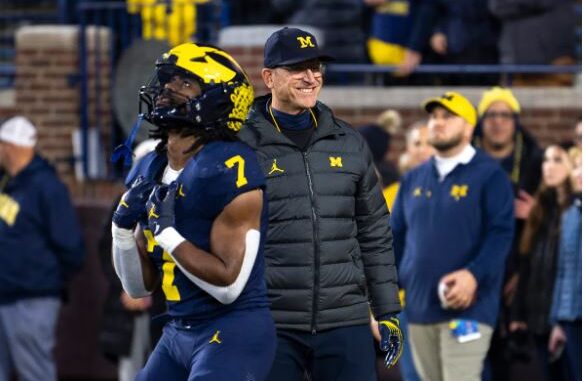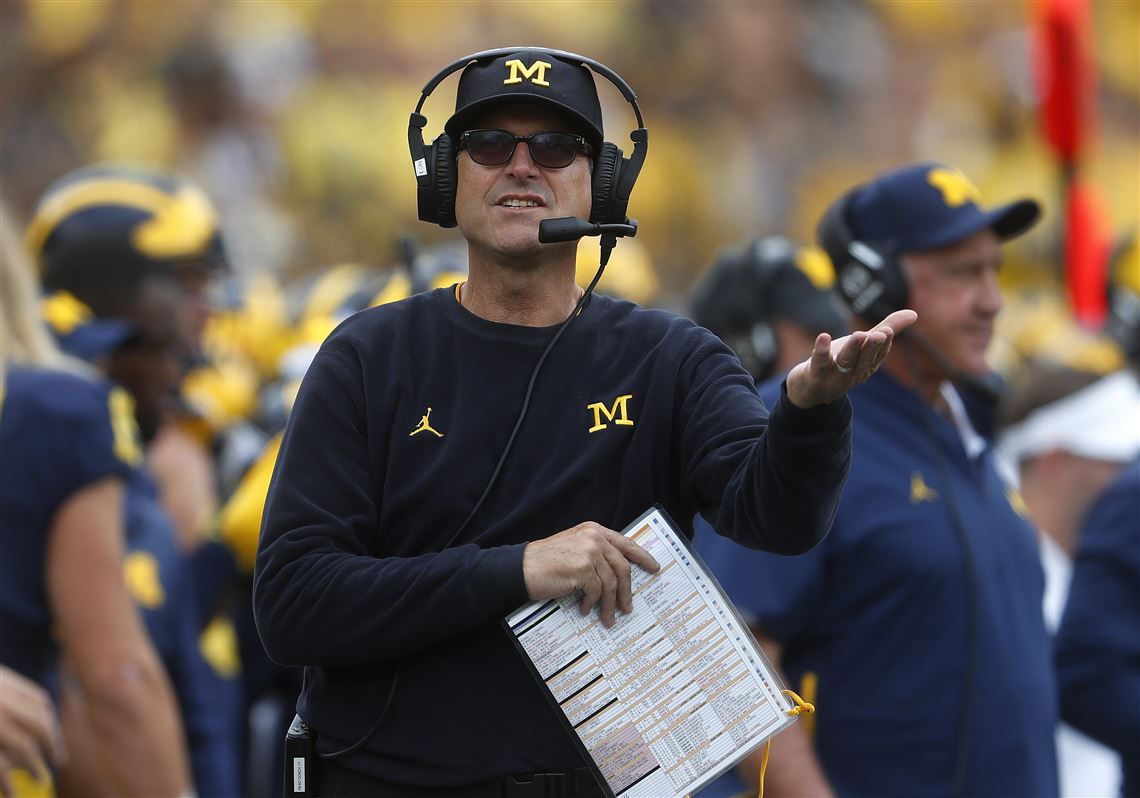
The Wolverines have gone on the offensive amid a swirling controversy centered on now-resigned Michigan football staffer Connor Stalions’ sign-stealing allegations.
According to reports, Michigan notified the Big Ten and the NCAA of evidence and documentation obtained by the program indicating that Ohio State, Rutgers, and Purdue collaborated on a sign-stealing project. These programs allegedly documented and aggregated Michigan’s signs in order to provide Purdue with a competitive advantage prior to its Big Ten Championship matchup against Michigan.
/cdn.vox-cdn.com/uploads/chorus_image/image/72827408/usa_today_21696681.0.jpg)
Images obtained and released by Sports Illustrated’s Richard Johnson and Pat Forde are allegedly just one more piece of evidence that Michigan presented to the Big Ten and the NCAA. A former Purdue staffer provided this evidence to Michigan just days ago, citing a previous relationship with some members of coach Jim Harbaugh’s staff as the reason for informing the Wolverines.
The former Purdue employee told The Athletic that he worked to decode opponents’ signs, but he shared the documentation with Michigan in the hopes of demonstrating how common both stealing and sharing signs are across Big Ten programs. The staffer also stated that the information he shared with Michigan was obtained legally.
He provided such evidence to emphasize how other teams would have had sign decoders like Connor Stalions. It’s unclear whether the former Big Ten employee thus endorsed the Stallion and Wolverines’ operation as legal. He did, however, state that he believed Michigan’s operation provided no competitive advantage and was thus unnecessary.
The majority of the criticism from those outside of Schembechler Hall does not stem from stealing signs, which is legal under NCAA rules. It is rather the method by which these scouting tactics were implemented. The allegations against Michigan and Stalions include documentation proving that Stalions purchased tickets for upcoming opponents’ games in his own name, among other potential violations involving a network of in-person ticket brokers.
Furthermore, Stalions is the subject of an NCAA investigation, conducted in collaboration with Central Michigan, into an unidentified person who resembled Stalions on the CMU sidelines during their game against Big Ten member, Michigan State.
Meanwhile, Michigan received a notice of potential disciplinary action from the Big Ten for an alleged violation of sportsmanship guidelines. Newly appointed Big Ten commissioner Tony Petitti, who already has a full plate, must now deal with Michigan’s latest response. Furthermore, Michigan is reportedly preparing for a lengthy legal battle if the Big Ten decides to suspend Harbaugh.
However, according to a recent Yahoo Sports report, the NCAA investigation has yet to identify a link between Harbaugh and any sign-stealing plot, further complicating matters. Petitti has once again been tasked with balancing the disciplinary desires of other Big Ten coaches while the results of the ongoing investigation are awaited. Michigan President Santa Ono voiced his support for Harbaugh over the weekend, pleading with Petitti in a now-leaked email to let the process play out before imposing any punishment.
Nonetheless, the severity of Michigan’s response is unclear based on the information that is currently available.
Though more evidence may be presented to the NCAA and Big Ten regarding the collaboration of the three other Big Ten programs in sign stealing, the evidence of directly illegal violations is currently slim.
NCAA bylaw 11.6.1 (including provisions 11.6.1.1 and 11.6.1.2) makes no mention of sharing stolen signs, only of in-person scouting bans. Article 11 of the NCAA bylaws, titled “Conduct and Employment of Athletics Personnel,” makes no mention of the words “share,” “collude,” or “collusion.”
If Michigan has a case for convicting Ohio State, Rutgers, or Purdue, it may find solace in the gray area of bylaw 11.6.1, which prohibits “off-campus, in-person scouting of future opponents.” Perhaps by collaborating with off-campus entities such as Ohio State and Rutgers, Michigan hopes to make the case that Purdue engaged in off-campus scouting. However, the Boilermakers must still conduct said scouting “in-person,” which opens up an entirely new can of worms.
/cdn.vox-cdn.com/uploads/chorus_image/image/69871426/usa_today_15414482.0.jpg)
Another avenue the Wolverines could pursue is proving a violation of Article 10 of the NCAA bylaws, which deals with unethical behavior by a program. So far, the vast majority of these cases have involved recruiting violations, monetary violations such as wagering, or both.
To date, The Michigan Daily has found no evidence of this policy being used to punish teamwork in a sign-stealing operation. Nonetheless, the general assessment of the Article is as follows:
(Programs, including coaches, staff, and players) shall conduct themselves in an honest and sportsmanlike manner at all times, so that intercollegiate athletics as a whole, their institutions, and they as individuals represent the honor and dignity of fair play and the generally recognized high standards associated with wholesome competitive sports.
The gray area reigns supreme once more. Michigan appears to be hoping that the evidence presented to the NCAA and Big Ten will show a violation of these guidelines.

Michigan, on the other hand, is likely to believe that its best chance of incriminating other Big Ten programs is to demonstrate a violation of the Big Ten’s “Sportsmanship” policy’s fundamental principles, which “include integrity of the competition, civility toward all, and respect, particularly toward opponents and officials.” Pettiti is once again the arbiter in such cases, because “the scope of (the rules’) application is intentionally left unrestricted in order to accommodate any behavior, which may occur in any setting, deemed by the Commissioner to offend the underlying objective this policy seeks to achieve.”
While Michigan is dealing with its own allegations, it appears to be hoping that providing its own reports of sign stealing will force Petitti to postpone any disciplinary action. Petitti has nearly complete discretion over the timeline, execution, evidence, and punishment that he considers when making a decision about potential repercussions under Big Ten bylaws 10.3 Procedural Elements, 10.3.1 Commissioner’s Discretion, Timeliness, and Due Process.
As this process unfolds, the ball is solely in Petitti’s court while the NCAA conducts its own investigation. Although the Big Ten was working to determine disciplinary action, Michigan’s response may complicate matters even more.

Leave a Reply